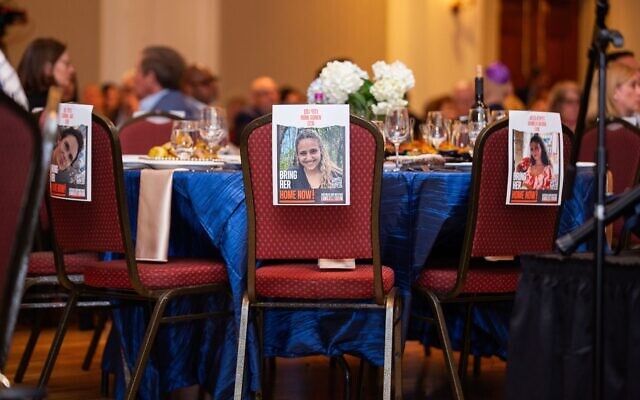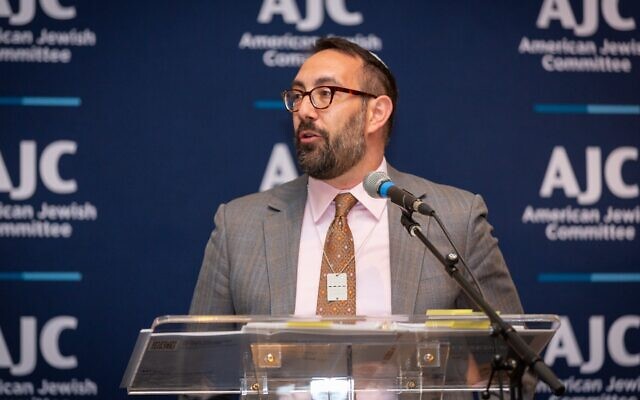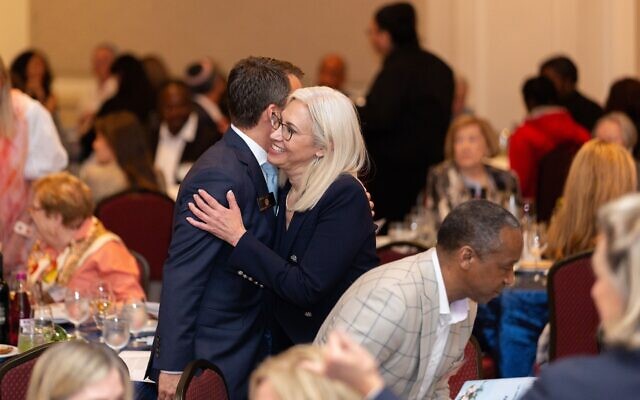Unity Becomes Timely Theme of AJC Seder
More than 350 community members attended the interfaith event sponsored by the American Jewish Committee.

There was a strong emphasis on the importance of unity at the American Jewish Committee’s annual Unity Seder this year. The signature event, which was held on April 8 at The Temple in Midtown, brought together a broad cross section of the Atlanta community.
The interfaith and racially diverse gathering included many religious leaders, politicians, educators, business executives, and community activists, who have been supporters of the work of the AJC. Almost three dozen of those who attended led readings from the 40-page Haggadah that was edited for the gathering.
In a greeting that was written for the event, the evening’s co-chairs, Elissa Fladell and Debbie Neese, stressed the importance of creating common communal goals and taking action together.
“Tonight, we come together under the banner of unity,” they wrote. “Unity is central to the work of AJC, whose mission is to enhance the wellbeing of the Jewish people and advance pluralism and democratic values for all.”

For the AJC, that goal of working for a greater sense of common purpose has taken on special meaning this year. According to the AJC’s National Director of Interreligious and Intergroup Relations, Rabbi Noam Marans, the American Jewish community approaches this year’s Passover holiday with a profound sense of loss. His prayer, which prefaced the seder ritual, points to the pain that he believes Jews everywhere share.
“At this seder,” Rabbi Marans’ opening prayer reads, “the deadliest day for the Jewish people since the Holocaust remains a fresh, open wound which continues to bleed. The October 7th massacre is indelibly seared in our hearts and minds.”
One of the tables at the Unity Seder was intentionally left empty, in remembrance of the hostages still held in Gaza. That sense of loss was echoed in the remarks by the AJC’s Southeastern Director, Dov Wilker, who described his personal struggle to come to terms with the Hamas attack. He was part of a group of two dozen rabbis and other Atlanta community leaders who visited Israel in February in support of the nation and to experience personally what had occurred there.
He told the capacity crowd in The Temple’s spacious social hall that the last six months have, in his view, taken an enormous toll on the Jewish community.

“We have been struggling over these past six months to find the language of empathy, of unity, of belonging. For us in the Jewish community, never before have we experienced a time like this. Never before have we been so afraid, so scared, so anxious. For we’ve been looking at the news, trying to see who are our friends, who are our partners.”
In his comments, Wilker voiced his gratitude to those who attended the seder event, particularly in view of the security concerns that Wilker believes has affected us all.
“I can tell you that over the last six months every single Jewish person has thought about what the impact of being in a Jewish space would have. But what tonight demonstrates is the belonging that we have, frankly, always felt. This is why it’s so important for us to be here tonight.”
In February, the national office of the AJC released a survey of American Jews finding that many have felt less safe than the year before. Nearly two-thirds of those surveyed felt less secure than a year ago, almost double what it had been just two years earlier, compared with just 31 percent of Jews who reported feeling less secure two years prior.
I can tell you that over the last six months every single Jewish person has thought about what the impact of being in a Jewish space would have. But what tonight demonstrates is the belonging that we have, frankly, always felt. This is why it’s so important for us to be here tonight.
Increasingly, Jews have been less public about identifying themselves as Jews. Nearly half of American Jews, according to the AJC, said they have either avoided identifying themselves as Jews in online posts or by their clothing choices or have forgone places or events out of concern for their safety or comfort as Jews. That’s up from 38 percent who said in 2022 that they did at least one of those things.
The AJC’s chief executive officer Ted Deutch said, at the time, that the statistics are part of a trend in American life.
“We’ve seen that antisemitism has been increasing,” Deutsch pointeded out, “even before the horrific Oct. 7 Hamas terrorist attack against Israel. This isn’t a new problem, but the explosion of antisemitism since Oct. 7 demands that we take collective action now.”
In a closing prayer, led by the Temple’s senior associate rabbi, Loren Filson Lapides, the attendees at the Unity Seder were encouraged to carry on in the spirit that the evening was intended to encourage.
“Let us leave here determined to nurture the friendships that began tonight. We celebrate the ancient promise of G-d’s redemption, as told through the Exodus story. Let us leave here tonight ready to write the Exodus story of our time, standing up to oppressor’s forces.”



comments